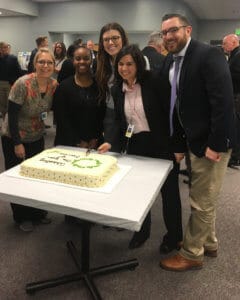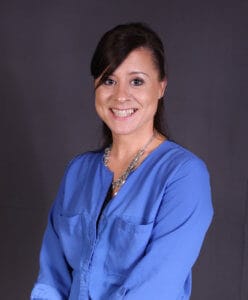
Outreach Events
The Ashley Outpatient Treatment Program celebrated their 1-year anniversary (and more than 550 patients treated!) with an Open House event at our Union Hospital location on January 26th.
Attendance was strong, as County Executives, judges, parole and probation officers, drug court case managers, Union Behavioral Health Staff, Emergency Department staff, local recovery houses, and a host of other providers came out to hear remarks from Ashley President and CEO, Becky Flood, who spoke of her roots in Cecil County and of bringing her career full-circle by “coming home.”
 Ashley’s Director of Outpatient Services, Dr. Mariana Izraelson, and Clinical Outreach Representative, Marc Butler also spoke, as did Dr. Cydney Teal, Chief Medical Officer, and Rod Kornrumpf, Executive Director of Behavioral Health Services, both of Union Hospital.
Ashley’s Director of Outpatient Services, Dr. Mariana Izraelson, and Clinical Outreach Representative, Marc Butler also spoke, as did Dr. Cydney Teal, Chief Medical Officer, and Rod Kornrumpf, Executive Director of Behavioral Health Services, both of Union Hospital.
One of the highlights of the program featured Ashley alumna, Brandy B., who inspired the entire room while sharing her experience at Ashley and in early recovery, expressing the deepest gratitude and thanks for so much and for so many.
The program concluded with tours of the facility and an assortment of refreshments. Plans are already underway for the 2-year anniversary celebration!
Other outreach events sponsored or co-sponsored by Ashley are coming up in Washington DC on February 22nd, as we are partnering with Onsite and others for Psychodrama Training: Healing Emotional Wounds Through Storytelling; and in Annapolis, MD on March 16th with Serenity Acres, Maryland Addiction Recovery Center and more as we present, The Missing Peace: Men and Trauma. CEU’s are available for these trainings and registration is required. For more information, visit our events page here.
The Annual Washington DC Gala
Tickets and sponsorships are still available for Ashley’s first major fundraising event of the year. On February 22nd, 2018, come join us for our 4th Annual DC Gala hosted by the Ashley Washington DC Leadership Council, held at the beautiful DC Four Seasons Hotel.
This year’s event will feature a private reception with the Leadership Council and Ashley executive staff, and a sumptuous, full course seated dinner. Proceeds will benefit the new Women’s Solarium at Ashley!
We are also proud to honor philanthropist and friend of Ashley, Ginny Grenham, with the presentation of the Michael K. Deaver Service Award. Ginny has spent more than 25 years in Washington, D.C., working in government and public relations, with a special focus on women’s health, wellness, technology, and Hispanic media. In addition to a range of corporate clients, Ginny works with non-profits in the areas of mental health and addiction, childhood obesity, and literacy and the arts in underserved populations.
Don’t miss this special annual event – for more information, click here.
Ashley Staff Spotlight: Marlena Faith Leonard, Admissions & Utilization Review Manager

This month, we cast the Staff Spotlight on Marlena Faith Leonard, Admissions and Utilization Review Manager. Marlena joined Ashley in April 2004 as an Aide in our Dietary Department. She’s also managed The Oak Store (on-campus retailer), and has held a number of positions in the Finance and Admissions Departments in her nearly 14 years.
We sat down with Marlena and talked with her about her time with Ashley:
What drew you to work in this field?
I originally wasn’t drawn to work in the field of addiction. I was in need of a job after moving to Maryland from Pennsylvania. I completed many applications around Harford County and Ashley was the first place to call me back. I interviewed for a position in the Dietary Department and was hired. After 9 months in Dietary, I interviewed for a position in the Admissions Department. I was hired as an Admissions Counselor and this is where my passion for Ashley and the field of addiction treatment started.
What drew you to work at Ashley?
As I stated previously, I wasn’t drawn to work at Ashley. I don’t believe I “chose” Ashley, Ashley “chose” me. I was fairly young when I started working here and was at the beginning of my adult life. I didn’t know what the future had in store for me but anyone that knows me knows I was going to take it on and “give it all I’ve got.” I had no idea at the time how much Ashley would contribute to my professional and personal life.
Anytime I have a difficult day, I think of Father Martin’s words: “How far do you go to help an alcoholic? As far as you can and then One Step More.” My passion for working at Ashley hasn’t diminished over the past 14 years. I believe all of us here are drawn to Ashley for a reason, even if we don’t know what that reason is in the beginning.
What is the most rewarding part of your job?
The most rewarding part of my job is helping someone’s life change in a good way, whether it’s a patient or a family member. It is extremely gratifying to hear someone say, after their time with us, “Ashley saved my life.”
What do you feel makes Ashley special?
I may be biased, but I believe the Admissions and Clinical Outreach Departments make us special. I love the team I work with. We help people from all walks of life and if we are unable to admit someone to Ashley, we will help them find another program.
The staff at Ashley sets us apart from any other program. We have a group of individuals who believe in our mission, who care deeply about what they do, and have a real passion for helping others.
Complementary Therapies in Addiction Treatment / Recovery
There is no single pathway to recovery – different people respond to different approaches. This is why an individualized, holistic recovery plan that draws on both traditional and complementary therapies offers the best possible outcomes.
Many complementary and alternative approaches have gained traction in recent years, adding to the toolbox of available options. Complementary therapies have numerous benefits for people in recovery, according to a study by the National Association of State Alcohol and Drug Abuse Directors. They improve engagement and retention in treatment, they help develop essential skills to reduce the risk of relapse, and they can improve one’s overall health and well-being. Some of the benefits include stress relief, greater spiritual awareness, improved mood, improved social functioning, and decreased symptoms of mental illness.
Following are some examples of effective complementary therapies that can enhance your patient’s recovery and improve their lives across all domains:
Art Therapy is one of the most common complementary therapies used in addiction treatment today, with nearly 37% of programs integrating it into their curriculum. Art therapy allows the patient to express themselves through creative exercises that help make sense of difficult emotions and experiences. Creating art provides a non-verbal way to tell one’s story, moving them away from an internal, contemplative state into an external, active state. This helps improve communication skills and promotes self-reflection.
Music Therapy promotes a positive emotional state and counters emotions like anger, depression, anxiety and stress. It has also been found to increase motivation to engage in recovery-oriented activities, and promotes effective self-expression. Listening to music, moving to it, and even creating it, helps participants engage on a variety of levels.
Research shows that Massage Therapy can significantly reduce symptoms associated with depression, anxiety, and chronic stress, and can promote high-quality sleep. There are a wide variety of effective massage techniques, including Shiatsu, Swedish massage, Reiki, Indian head massage, and more, all of which help to ease muscle tension and improve blood circulation.
Psychodrama is an experiential treatment during which participants act out a scene, often related to an interpersonal issue. Two different techniques that are often employed are role-reversal, or “standing in another’s shoes“; and doubling, which allows the therapist to act out the inner voice of the patient. These methods can broaden the patients understanding of their own behaviors and help them develop more effective coping skills. Psychodrama Training is the subject of our CE event in Washington, DC on February 22nd. For more information, click here.
These are just a few of the many and varied complementary therapies proven effective in enhancing positive outcomes. The lessons learned and skills gained while engaging in these complementary therapies often extend beyond the addiction and help your patients improve other areas of their lives.
